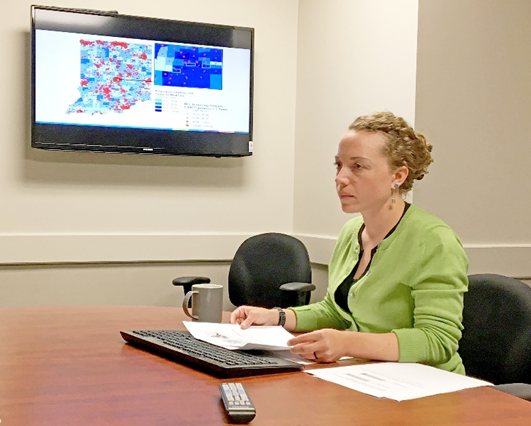Pediatric Blood Lead Level Screening Rates Among Populations with Risk Factors for Lead Exposure — Indiana, 2017
- We identified four Indiana cities that had areas where children may have a higher risk of lead exposure due to low socioeconomic status and old housing containing lead paint, but also had low blood lead screening rates in children younger than 7 years old.
- No level of lead exposure is considered safe for children as even levels as low as 5 µg/dL can cause decreased IQ and attention-related deficits. There are approximately 500,000 U.S. children ages 1-5 with blood lead levels above 5 µg/dL.
- Additional outreach to healthcare providers in Indiana is needed to encourage blood lead screening in children, especially for those children on Medicaid and those who live in old housing, to reduce future exposures.
“Lead exposure in children in the United States continues to be an important public health issue. We need to continually work to identify the populations affected by lead exposure and improve blood lead screening rates within those populations.”
– Kathryn Gaub, DVM, MPH, EIS Class of 2018
 [PNG - 501 KB]
[PNG - 501 KB]EIS officer Kathryn Gaub, DVM, MPH, discusses areas identified by the analysis and implications for increasing screening with staff from the Indiana State Department of Health
CDC Media Relations
(404) 639-3286
media@cdc.gov

Kathryn Gaub, DVM, MPH,
EIS Class of 2018
Indiana Department of Health
Education: MPH: Oregon State University, Present
DVM: Oregon State University, 2017
BS: Eastern Oregon University, 2010
Work Experience: Emergency Intern, Salem Veterinary Emergency Clinic, Salem, Oregon,2017-Present
Student Researcher, Biomedical Sciences Summer Research Program, Corvallis, Oregon, 2015-2015
Field Biologist/Observer, Saltwater Inc., Anchorage, Alaska, 2010-2012
Volunteer Experience: Delegate for Oregon State University, Student American Veterinary Medical Association, Corvallis, Oregon, 2013-2016
OLEADS Co-Chair, Oregon Leadership Experience and Dedicated Service (OLEADS), Corvallis, Oregon, 2013-2015